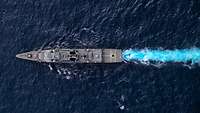
Indo-Pacific Deployment 2021
Germany is showing maritime presence in the Indo-Pacific region with its frigate “Bayern”.


The frigate returned to Germany on 18 February after almost seven months of diplomatic duties and naval exercises in the Indo-Pacific.
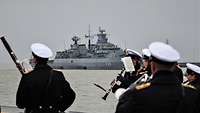
With hurricane “Zeynep” in their back: Frigate “Bayern” is back earlier than planned
Bundeswehr/Leon RodewaldIn addition to family and friends, representatives from the Ministry of Defence and the German Navy Headquarters greeted the vessel at its home base in Wilhelmshaven: Parliamentary Secretary of State Siemtje Möller, Deputy Inspector General Lieutenant General Markus Laubenthal and the Commander Task Forces Rear Admiral Jürgen zur Mühlen.
Möller also welcomed the “Bayern” and its crew on behalf of Federal Minister of Defence Christine Lambrecht. It was very important to her and the other representatives to be there in person despite adverse weather conditions. “We were there live when you arrived after this historic voyage,” said the Secretary of State. “Historic, because the deployment was not only a premiere for ‘Bayern’, but also for Germany, to show the flag in the Indo-Pacific, in this important geostrategic area. We are very proud of you.”
Rear Admiral zur Mühlen stated that the greatest challenge was probably having to keep planning with the pandemic. “It took a lot of energy and sometimes emotions. But you did it brilliantly,” he said. “I can only say: Bravo Zulu – great performance!”
The ship’s commanding officer, commander Tilo Kalski, thanked Möller, Laubenthal and zur Mühlen for coming on board just before the proper arrival at Wilhelmshaven naval base. Such visits, including en route during the deployment, underscored the importance of the mission. “This really made it obvious to the crew what we had achieved at the diplomatic level,” said Kalski.
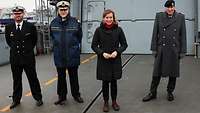
Left to right: Commanding officer Commander Tilo Kalski with the welcome committee: Rear Admiral Jürgen zur Mühlen, Parliamentary Secretary of State Siemtje Möller and Lieutenant General Markus Laubenthal
Bundeswehr/Leon RodewaldThe record of “Bayern”’s Indo-Pacific Deployment 2021 includes eight official port visits that the ship and crew completed as “ambassadors in blue”: in Pakistan, Australia, Japan, South Korea, Singapore, Vietnam, Sri Lanka and India. For a ninth formal visit, the frigate called at Israel on its way home.
In addition to this form of naval diplomacy, there were around 30 individual exercises with the naval forces of 17 different nations. As a rule, these were so-called passing exercises that lasted no longer than one day. However, at the end of November, “Bayern” also joined a regular large-scale naval exercise by the Japanese Maritime Self Defense Forces. “In addition to the port visits in the exotic Southeast Asian region, participating in the Annual Exercise 2021 with over 20 other warships from Japan, the USA, Canada and New Zealand was a unique operational experience for us,” reports Kalski.
The participation of “Bayern” in monitoring the UNUnited Nations sanctions against North Korea in mid-November was also of great political importance. The measures taken by the UNUnited Nations Security Council are intended to prevent the Kim Jong-Un regime from developing weapons of mass destruction and ballistic missiles. The frigate was the first German warship to contribute to this.
During the Indo -Pacific Deployment, frigate “Bayern” travelled a good 43,000 nautical miles, around twice the length of the equator. For Kalski, the deployment, with its military and diplomatic components, was “consistently successful”. This is mainly thanks to the men and women of his crew. “Both because of their personal skills, but especially with their iron discipline in view of the special circumstances of the pandemic situation worldwide, we were able to implement every project, every port visit according to orders,” says Kalski.
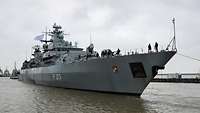
Sound and safe at her home base: “Bayern” just a few moments before the mooring lines went over to land
Bundeswehr/Leon RodewaldThe stress of operating in pandemic conditions has been offset in two ways. On the one hand, the entire crew of the “Bayern” had been vaccinated against COVID-19Coronavirus Disease 2019 and some had even been boosted. This largely fulfilled the local official requirements for entry of the German ship into foreign ports. “Despite the discipline of my women and men, there was always the possibility of infection in the ports – and especially because of the current Omicron wave,” says the commanding officer. “However, with our vaccination protection, an infection meant more of a danger to the completion of the assignment than to the health of the individual.”
On the other hand, vaccination protection also made proper shore leave possible for the crew four times – in compliance with local rules. “Although it wasn’t feasible in all countries visited, my people were able to stretch their feet and enjoy local tourist attractions in Perth, Tokyo, Busan and Singapore during this month-long deployment,” says Kalski.
The frigate “Bayern” set out on 2 August 2021 for this training and presence voyage. The Federal Government, in particular the Foreign Office and the Ministry of Defence, had previously decided on the naval diplomatic mission. However, the deployment of the “Bayern” was not a military operation, such as Germany’s naval participation in the UNIFILUnited Nations Interim Force in Lebanon mission. It therefore did not have to be mandated additionally by the German parliament, the Bundestag.
by German Navy Press and Information Centre (mmo) email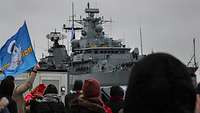
Despite arriving early: a good two hundred family members and friends were able to be there when their loved ones returned home
Bundeswehr/Leon Rodewald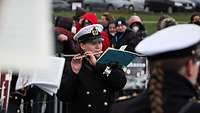
The Wilhelmshaven Naval Band played on when the storm was gathering
Bundeswehr/Leon Rodewald
Personal joy of reunion, packed weatherproof: “Welcome back, Charly!” for the ship’s baker
Bundeswehr/Leon Rodewald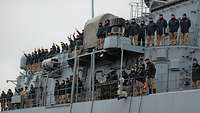
“We were on duty for six and a half months, twenty-four-seven, day and night,” sums up commanding officer Kalski. “Now, I wish my crew the recovery period they deserve.”
Bundeswehr/Leon Rodewald
No more words needed
Bundeswehr/Leon Rodewald